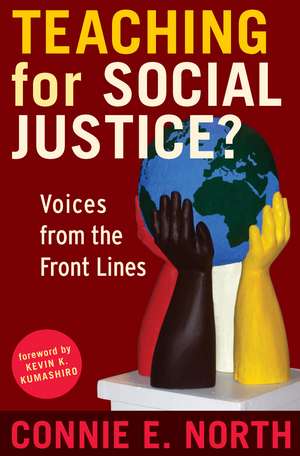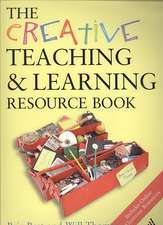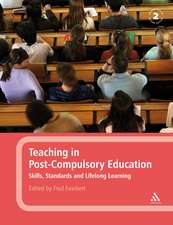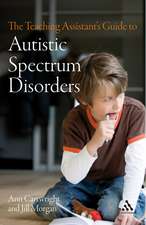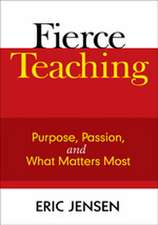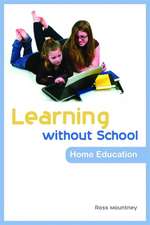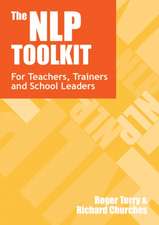Teaching for Social Justice?: Voices from the Front Lines
Autor Connie E. Northen Limba Engleză Paperback – 28 feb 2009
| Toate formatele și edițiile | Preț | Express |
|---|---|---|
| Paperback (1) | 433.90 lei 6-8 săpt. | |
| Taylor & Francis – 28 feb 2009 | 433.90 lei 6-8 săpt. | |
| Hardback (1) | 1105.24 lei 6-8 săpt. | |
| Taylor & Francis – 30 oct 2008 | 1105.24 lei 6-8 săpt. |
Preț: 433.90 lei
Nou
Puncte Express: 651
Preț estimativ în valută:
83.04€ • 85.78$ • 69.11£
83.04€ • 85.78$ • 69.11£
Carte tipărită la comandă
Livrare economică 25 martie-08 aprilie
Preluare comenzi: 021 569.72.76
Specificații
ISBN-13: 9781594516184
ISBN-10: 1594516189
Pagini: 208
Dimensiuni: 152 x 229 x 18 mm
Greutate: 0.25 kg
Ediția:1
Editura: Taylor & Francis
Colecția Routledge
Locul publicării:Oxford, United Kingdom
ISBN-10: 1594516189
Pagini: 208
Dimensiuni: 152 x 229 x 18 mm
Greutate: 0.25 kg
Ediția:1
Editura: Taylor & Francis
Colecția Routledge
Locul publicării:Oxford, United Kingdom
Recenzii
“Brilliant … Teaching for Social Justice? offers … a framework of five ‘literacies’ … that can be immeasurably useful for evaluating current work and imagining new possibilities. I found myself constantly thinking about my own classrooms, mapping various aspects of my teaching onto this framework, and asking myself which literacies I seem to be advancing in different contexts and where I could be doing more.”
—from the foreword by Kevin K. Kumashiro
“Connie North challenges popular thinking on social justice in public school classrooms through a frank and provoking discussion on teaching. In so doing, she provides a framework on how to critically question how we think, talk, and act in our classrooms and within the community of fellow teachers. It is without question a powerful but humbling read.”
—David Stovall, University of Illinois at Chicago
“This beautifully written account of collaborative research by a university teacher educator and four teachers explores the meaning, significance, and dilemmas of teaching for social justice. It is an exemplar of democratically conducted and ethically responsible research initiated by the teacher educator that reveals the many meanings and complexities associated with social justice work in education. This book is must reading for all educators who care about making social justice teaching more than a vague slogan.”
—Ken Zeichner, University of Wisconsin-Madison
“Naming five distinct literacies showcases how new ways of looking at literacy can provide new tools to accomplish social justice. The efforts of these classroom teachers can serve as models for others who want, or who have struggled, to nurture in their students the skills they need to make their world a place that has meaning and fairness. Recommended.”
—CHOICE
—from the foreword by Kevin K. Kumashiro
“Connie North challenges popular thinking on social justice in public school classrooms through a frank and provoking discussion on teaching. In so doing, she provides a framework on how to critically question how we think, talk, and act in our classrooms and within the community of fellow teachers. It is without question a powerful but humbling read.”
—David Stovall, University of Illinois at Chicago
“This beautifully written account of collaborative research by a university teacher educator and four teachers explores the meaning, significance, and dilemmas of teaching for social justice. It is an exemplar of democratically conducted and ethically responsible research initiated by the teacher educator that reveals the many meanings and complexities associated with social justice work in education. This book is must reading for all educators who care about making social justice teaching more than a vague slogan.”
—Ken Zeichner, University of Wisconsin-Madison
“Naming five distinct literacies showcases how new ways of looking at literacy can provide new tools to accomplish social justice. The efforts of these classroom teachers can serve as models for others who want, or who have struggled, to nurture in their students the skills they need to make their world a place that has meaning and fairness. Recommended.”
—CHOICE
Cuprins
Introduction; Part I Functional Literacy; Chapter 1 Functional Literacy in Context; Chapter 2 Developing Functional Literacy for Social Justice?; Part II Critical Literacy; Chapter 3 Critical Literacy in Context; Chapter 4 The Limits of Critical Literacy in Isolation; Part III Relational Literacy; Chapter 5 Relational Literacy in Context; Chapter 6 More than “Fluffy Talk”; Part IV Democratic Literacy; Chapter 7 Democratic Literacy in Context; Chapter 8 Reclaiming Democratic Literacy, Cautiously; Part V Visionary Literacy; Chapter 9 Do Maggots Have Protein?; Chapter 10 Conclusion;
Descriere
Examines the process of four K-12 educators and a university-based researcher discussing, studying, and acting on the potential power of social justice. This book analyzes the complex, interconnected competencies pursued in the name of social justice, including functional, critical, relational, democratic, and visionary literacies.
